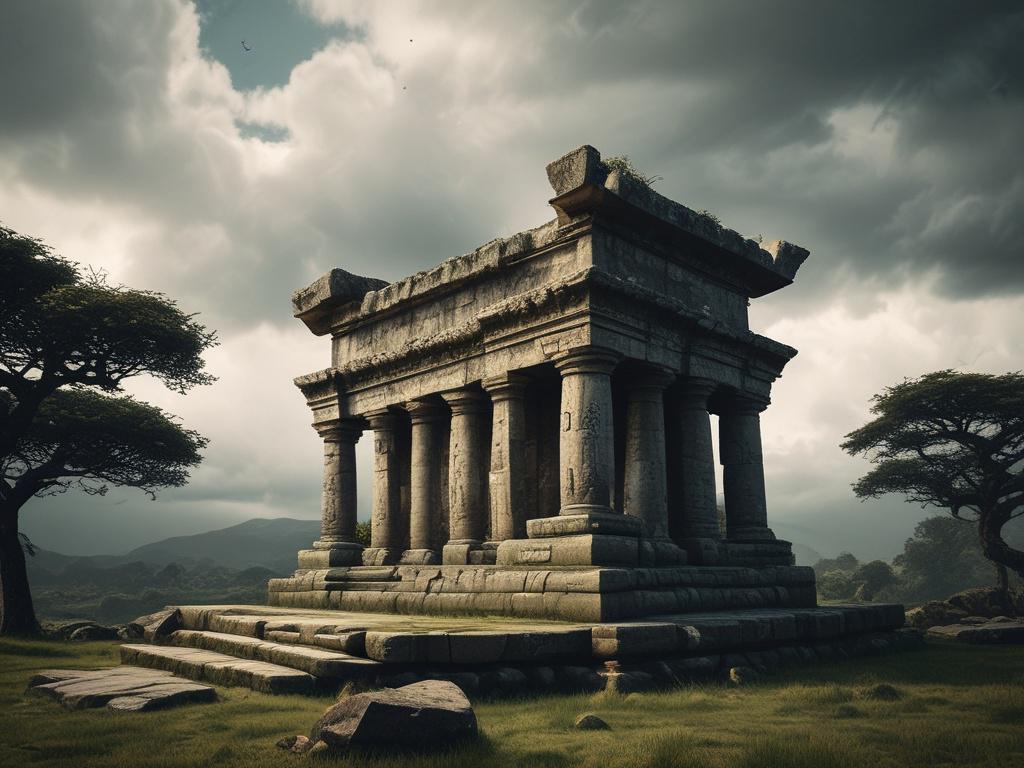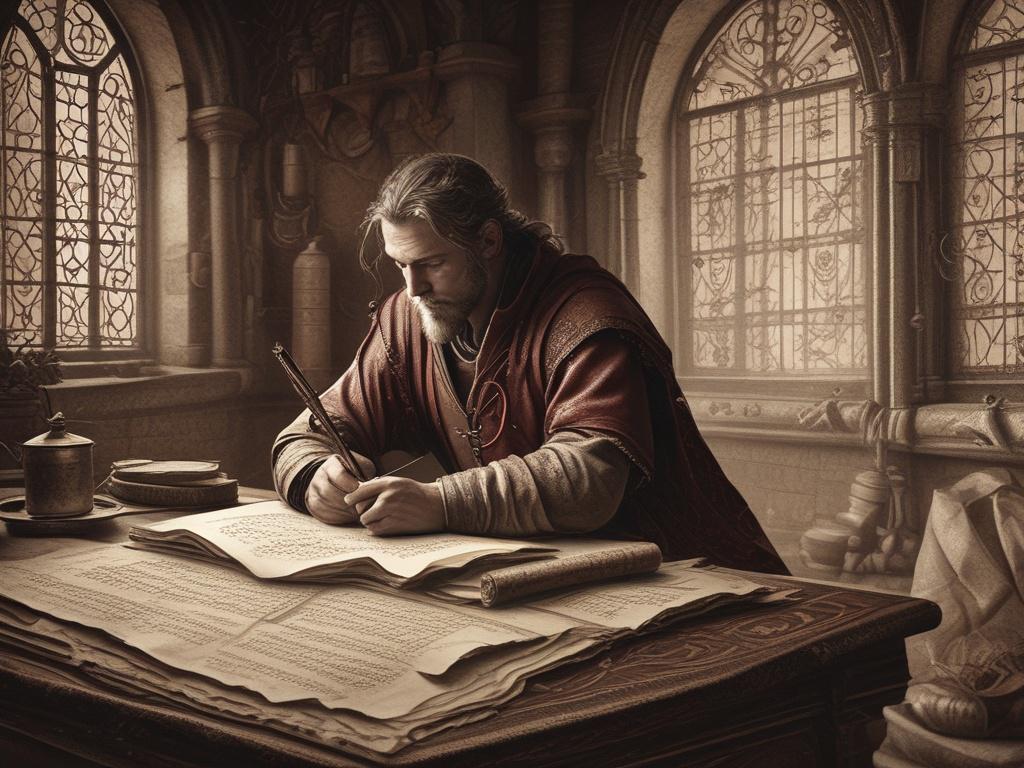Liturgical. brutal. immersive.
The wind came late and hot, dragging heat through the valley like a drunk hauling a corpse. Ash from last night’s cookfires lifted in thin spirals and tore apart on the gust. Pennons overhead snapped like ribs under an iron-shod boot.
On the ridge, the king’s tent hunched above muck and fly-thick straw, canvas whining on the ropes. It looked less like shelter than a siege engine that hadn’t yet chosen a side.
The sentry wasted ceremony. He yanked the flap and spoke like gravel poured into a helm. “His Grace waits.”
Roger de Lacy ducked through.
Inside, the air clamped down. Light bled through the canvas—a dirty, rust-red wash that tinted every surface the color of dried blood. The floor—baked earth split to curling cracks where piss had dried in the heat—was littered with crushed straw and the leavings of men who lived hard and dirtier.
The stink was layered—sweat over vinegar, boiled onions over rotting leather, and beneath it all the throat-tight tang of something dead and forgotten.
Braziers hissed in the corners and gave no heat. Melted tallow drooped in waxen chains, guttering shadows across the walls. Tapestries sagged under damp, and stitched martyrs and hunting beasts crawled with flies bloated on royal indifference.
In the shadows a heap of mail steamed, rings black with rust and skin-salt. A writing desk slouched under a crooked banner, buried under scrolls, a toppled inkwell, and the ant-ridden husk of a figcake. A split-shafted arrow still jutted from a cracked target board, and beside it an unstrung bow lay slack as a gutted fish.
The king sat at a low bench, sleeves rolled, forearms scab-flecked and veined, working a bowstring with fingers browned by sun and dirt. A loose bracer dangled at his wrist. He didn’t look up. “You’re late,” he said.
“I came when the wind changed,” de Lacy answered.
John scoffed, tightening a knot before levering himself upright, joints cracking like old timber. “Then we’ve both been reading the wrong wind—fools chasing false omens.”
He crossed to a brazier and poured wine into two iron-banded goblets, the metal too hot for any but calloused hands. Steam rose, spiced and heavy. He offered one across.
De Lacy took it without drinking.
“Relax,” the king said, mouth curling. “If you were on trial there’d be a bishop here farting incense and asking God which of us He likes more.”
Heat from the cup worked into de Lacy’s fingers, and the ache in his scarred leg answered it—old pain, louder in summer.
John’s gaze stayed on his drink. The shine in his eyes said drunk, but not yet forgetful. His thumb worried a wine-stained seal half-buried under a heel of bread. “Do you know where I was, Roger, when Philip crossed into my lands this spring?”
De Lacy didn’t answer.
“At Bonneville. Eastertide. Dining with three of the most spineless barnacles scraped off England’s nobility—Everard de Tracy, Baldwin de Dunstanville, and that flabby arsewipe Hugh FitzWalter. We’d just finished stuffing ourselves with venison and hypocrisy when the messengers arrived.”
He laughed once, low and bitter.
“They knelt, breathless. Told me Philip had crossed the Seine at Vernon with banners high and priests in tow. Called it a righteous cause. They always do.”
He turned the wine in his cup, studying it like prophecy. “And do you know what I said?” He didn’t wait. “‘Let him do so. Whatever he now seizes I will one day recover.’”
John looked up, smiling without warmth.
“They stared like I’d just shat on the altar cloth. FitzWalter even looked offended. All three thinking their precious acres in Normandy weighed more than my kingdom entire. They wouldn’t give a French foutre for England so long as their vineyards watered and their rents flowed.”
His voice sharpened. “So I told them—‘By God’s teeth—yes, some will die. More will die if we resist. And isn’t it more likely still that one day we’ll all die? Let Philip come. Let him bleed for every stone and keep. Let the French dine on our land while we prepare to bury them under it.’”
He drank deep, wiped his sleeve, and gave a humorless chuckle. “They didn’t like that, Roger. No saints. No banners. No promises. Just truth. And you know what truth buys in a room full of barons?”
The silence between them answered.
“Doubt,” John said, grinning ugly and honest. “It buys you doubt.”
He drained the goblet, belched half-contained, and leaned back. “Do you know where this began? Not with Philip. Not with Arthur. Not even with my sainted brother. No.”
He jabbed at the air, accusing a ghost. “It began with that holy bedwetter Edward the Confessor.”
De Lacy tipped his head, listening.
“Saint Edward. King of England and keeper of his own cock. Should’ve been a monk. Spent his reign praying for sons while refusing to stick his prick in his queen. Legend says she had the most virtuous tits in Christendom—soft as dove-feathered relics—and sacred enough to bring the best men to their knees.”
The goblet slammed onto the table, rattling scrolls. “Well, they tempted no bastard worth marrying, because the holy fool wouldn’t touch her. And for that piety we got Harold. Then William. Then blood. Then centuries of Frenchmen sniffing around like dogs in a nunnery.”
Sweat-matted hair fell across his brow. He raked it back. “Virtue,” he spat, “has bought us vice. And mine—” he laughed, sharp and self-mocking—“mine are arguably the worst. Perhaps that’s the price. England got a saint for a king and me for the balance.”
His eyes, red-rimmed and damp, fixed on de Lacy. “I sard too much, drink too early, and kill too late. But I never lied about it.”
A pause. “That’s more than you can say for Edward and his untouched saint-queen.”
The brazier spat and shadows shifted.
Immerse yourself in rich narratives that blend sacred realism and the raw truths of history. Experience tales that evoke deep emotions and vivid imagery.


